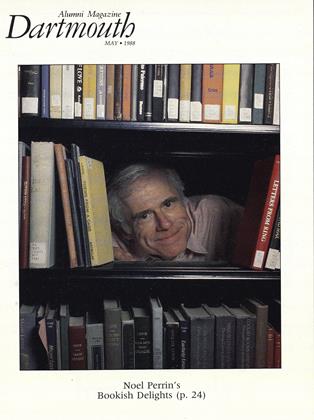Ever since he came to Dartmouth in 1959, English Professor Noel Perrin has punctuated his teaching with a witty host of essays and books, including "A Passport Secretly Green," "First Person Rural," and two sequels.
"The essence of Mr. Perrin's humor is delight," wrote critic J.A. May on the professor's scores of essays. "Delight at the humanity of humans. Delight at their variety. Delight at their freshness. Delight in the English language. Not a wild delight, not a simpering delight, but a toughly gentle and sardonic de- light." Those who agree with May's assessment should not be surprised at the title of Perrin's newest book, "A Reader's Delight."
Although this latest collection deals exclusively with the joys of reading, some of his greatest and most widely publicized pleasures have little to do with books. Reared in Westchester County, New York, and educated at Williams College (B.A. 1949), Duke University (M.A. 1950) and Cambridge University (M. Litt. 1958), Perrin considers that the "main part" of his life began when he came to Dartmouth and bought a farm in Thetford, Ver- mont. It was a perfect fit, one that bound him to memories of fishing and hunting with his father, and al- lowed him, as he put it, to edge "steadily closer to being a farmer, without ever quite becoming a 'real one,' " while simultaneously pur- suing academic and writing careers.
Perrin's essays are prisms that re- flect this multifaceted life. Rural es- says comprise the greatest number (he once wrote, "If you were to buy a pamphlet on how to make maple syrup, I would be quite likely to have written it,"), followed by en- vironmental journalism and writing about books.
Perrin is equally eclectic in the classroom. During his first decade at Dartmouth he taught a freshman seminar on "progress," which eventually led to a Guggenheim Fel- lowship and a book, "Giving Up the Gun: Japan's Reversion to the Sword, 1543-1879." In it Perrin doc- uments the Japanese rejection of guns to illustrate his thesis that peo- ple can selectively and consciously turn their backs on "inevitable" technological advances. Yet another offshoot of his interest in "prog- ress" has been a foray into science fiction; he teaches a course in the subject.
Perrin speaks openly about a failed attempt at producing a novel, and he confesses that he lacks the staying power of John McPhee for writing longer works of nonfiction. The professor apologizes for deal- ing in ideas rather than people. "People are the most important subject," he says. One might as- sume from his latest work, how- ever, that he finds books a more accessible delight.
 View Full Issue
View Full Issue
More From This Issue
-
 Cover Story
Cover StoryJonathan Corncob and Other Almost Classics
May 1988 By Noel Perrin -
 Feature
FeatureRunning with the Big Boys
May 1988 By Mike Fadil '85 -
 Feature
FeatureAt Dartmouth, the Intellectual Is on the Margin
May 1988 By Karen Avenoso '88 -
 Feature
FeatureDear President Freedman...
May 1988 By Tom Bloomer '53 -
 Article
ArticleAlumni Writers Approve Review's Tongue-Lashing
May 1988 -
 Lettter from the Editor
Lettter from the EditorResponse: The Real Women's Issues
May 1988 By Mary G. Turco
Karen Endicott
-
 Article
ArticleDartmouth Authors
MAY • 1988 By Karen Endicott -
 Article
ArticleA Hero in American Education
NOVEMBER 1989 By Karen Endicott -
 Article
ArticleSound Words
FEBRUARY 1994 By Karen Endicott -
 Article
ArticleTied Up with Strings
December 1994 By Karen Endicott -
 Article
ArticleWHAT the ELDERS WROTE
October 1995 By Karen Endicott -
 Feature
FeatureComing of Age in Hanover
Nov/Dec 2001 By KAREN ENDICOTT







